Are You Ready to Be a Change-Agent for Agency?
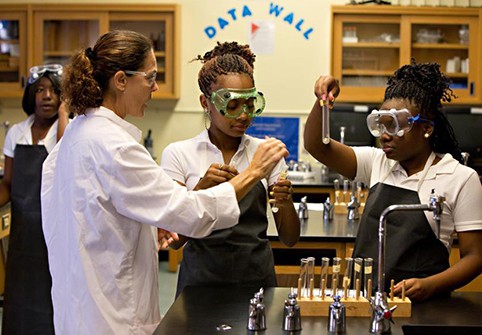
If we heard a rallying cry at ISTE 2015, it was “Agency!” — for students, for teachers, for learners of any stripe. If we can become active learners together, the collective wisdom held, we can make schools relevant again.
What is agency? Essentially it means taking charge of one’s own learning. Acting on one’s own passions. Assuming responsibility for filling one’s own cup of knowledge to serve purposes we have defined for ourselves. If we are agents of learning, we are actors in our own stories of investigation, creation, and sharing. This applies to every level of education, students and teachers alike.
If you think about it, the education world is full of agents. We chose the profession of teaching because we love learning and we wanted to make an impact on the future our students will inhabit. We wanted to be change-agents. Yet we snatch agency from our students even as agency is snatched from us by over-emphasis on assessments, by rigid curricula, and by well-meaning school leaders.
It’s time that we let go and gave back our students’ agency to learn. It’s time that we assumed agency in our own professional development. It’s time that we adopted the role of experienced co-learner with students to help them grow as they confront obstacles to their learning. It’s time that we stopped clearing away all the bumps and stepped aside to let kids do the tricky stuff, the fun stuff, the hard stuff, the menial stuff — because that’s where the learning happens. It’s time that we gave up the controls, so that our students can learn how to drive their own learning lives, time that we took control of our own learning to help our kids.
What’s stopping us? Whether we are afraid, out of practice, or overwhelmed by the minutiae of the everyday demands of our professional lives, we need reawaken change-agents we once were and give our students and ourselves time and space to learn.
Inspiration x 3
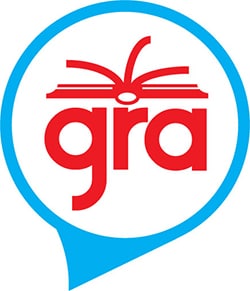 Pernille Ripp delivered a rousing “Ignite” speech at ISTE that cuts to heart of our work with students. She asks us to quit stalling and “break the rules,” if we have to, to give our classrooms “back to our students,” to give them the agency that was once theirs for learning. She asks us to step up and change education from within by adjusting our own thinking and doing the “little things” that can make a huge impact. The keys are “choice, voice, and the power to explore” for all of us!
Pernille Ripp delivered a rousing “Ignite” speech at ISTE that cuts to heart of our work with students. She asks us to quit stalling and “break the rules,” if we have to, to give our classrooms “back to our students,” to give them the agency that was once theirs for learning. She asks us to step up and change education from within by adjusting our own thinking and doing the “little things” that can make a huge impact. The keys are “choice, voice, and the power to explore” for all of us!
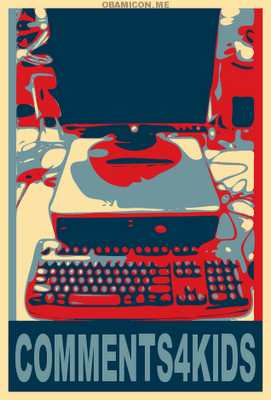 Josh Stumpenhorst echoed Ripp’s statements as he exhorted teachers to start “Pushing the Limits” in his closing keynote speech at ISTE. Yes, we will be uncomfortable, we will feel constrained, but we need to imagine the possibilities of change within those constraints even as we test their boundaries. We can do this by learning from others, like Ripp (with the Global Read Aloud), who have taken simple ideas and put them into play. We need to push the boundaries of our students’ perspectives — by giving them means to connect with the world, to receive real feedback (as with William Chamberlain’s Comments4Kids), by making solutions for real problems that have purpose (for example, Dr. Chris Craft’s hand-a-thon). Yet, even as we test the boundaries for our kids, we need to expect that our good work will be challenged by others, and we need to take risks, persevere, and encourage others around us to push their limits, whatever they may be, as well. Only then will we change the nature of learning in schools.
Josh Stumpenhorst echoed Ripp’s statements as he exhorted teachers to start “Pushing the Limits” in his closing keynote speech at ISTE. Yes, we will be uncomfortable, we will feel constrained, but we need to imagine the possibilities of change within those constraints even as we test their boundaries. We can do this by learning from others, like Ripp (with the Global Read Aloud), who have taken simple ideas and put them into play. We need to push the boundaries of our students’ perspectives — by giving them means to connect with the world, to receive real feedback (as with William Chamberlain’s Comments4Kids), by making solutions for real problems that have purpose (for example, Dr. Chris Craft’s hand-a-thon). Yet, even as we test the boundaries for our kids, we need to expect that our good work will be challenged by others, and we need to take risks, persevere, and encourage others around us to push their limits, whatever they may be, as well. Only then will we change the nature of learning in schools.
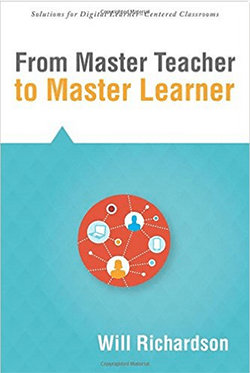 Will Richardson, a fixture at ISTE who has been teaching us about teaching for more than a decade, has championed teacher and student agency for at least that long. In his new book, From Master Teacher to Master Learner, he reminds us that we have dallied too long, hemming and hawing over the obstacles in our way. He too calls on teachers to change education by sharing their own expertise as master learners with students, by becoming co-learners with them, and by allowing students the freedom to design their own curricula and assessments. Richardson sees teachers as playing a critical role as models of learning for students and in helping students develop the skills they need for agency-driven modern learning.
Will Richardson, a fixture at ISTE who has been teaching us about teaching for more than a decade, has championed teacher and student agency for at least that long. In his new book, From Master Teacher to Master Learner, he reminds us that we have dallied too long, hemming and hawing over the obstacles in our way. He too calls on teachers to change education by sharing their own expertise as master learners with students, by becoming co-learners with them, and by allowing students the freedom to design their own curricula and assessments. Richardson sees teachers as playing a critical role as models of learning for students and in helping students develop the skills they need for agency-driven modern learning.
The How of Letting Go
We know how to do this, and we know we must. Really, if we think about it, we just need to remind ourselves that we assume agency when we tackle anything new — whether in the summer when we are designing a garden space or on a weeknight when we are gathering materials for class. Now we need to grant that freedom to learn to our students.
- First, we must grant ourselves permission to do what is right for kids and make ways for them to learn authentically.
- We need to trust students to learn the same ways we learn now, rather than ask them to conform to a way of learning that is no longer relevant in their (or our) world.
- We need to open up a dialogue with our students — and really listen to what they have to say about what they want to learn and why.
- We need to work on framing the kinds of questions that will prompt students to move beyond an initial insight into deeper inquiry.
- We need to let students tell their stories about learning and help them shape these into more positive narratives.
- We need to model learning along with our students, using our experience as learners to show them how.
- We (or our districts or departments) can design a landscape to be explored, a challenge to be overcome, or a structure to be filled in. But we need to give choice to students for filling in the empty spaces.
- We must teach ourselves how to ask our struggling students, “How are you going to solve that problem?”
- We must hold our students — and ourselves — to a standard of authenticity. As Richardson reminds us, students can spot a fraud of authenticity a mile away.
- We should always remember, then things get rough, that true learning inspires more learning.
- We need to watch and wait for the learning to happen, and then help students document the process and reflect on their progress.
Then we can celebrate our learning and begin again, because the learning feeds itself in a never-ending cycle of growth.
For more blogs by Susan, check out:



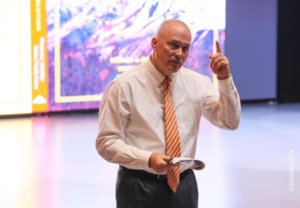


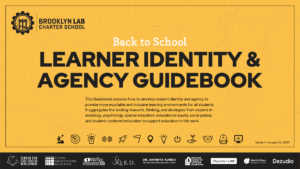
Amanda Lenon
Hi Susan, I found your blog through a tweet from Will Richardson. I've just started my own education blog and was keen to read others. Wow! I love this post - I just saw Will speak here in Melbourne and wrote about it on my blog, although after reading yours I think I have much to learn. Any advice for a new blogger?
Replies
Susan Davis
Amanda, thanks for your response! I must say that I learned much of what I know about blogging from Will! The best advice I can give is to keep sharing and connecting! I'm happy to know another teacher-blogger in Australia!
Jon
Solid article, thank you. So good conversing with you at Edcamp on this level. Let's keep the conversation flowing... hoping we can get coffee one of the days after work.
So glad to hear that you know Will. He is an old friend and still my mentor today, we used to work closely together in an NJ public school for about 5 years when I first started teaching. I recently read from Master Teacher to Master Learner and loved it. Plenty of quotes to live by within. http://jonpennington.net/#!jig[1]/https://scontent.cdninstagram.com/hphotos-xaf1/t51.2885-15/s640x640/sh0.08/e35/11881765_1499986116984165_512823012_n.jpg
There is another book that will be released this month, also part of the Modern Learning Series, called "The New Pillars of Modern Teaching." It is excellent. Check it out: http://www.gayleallen.net/book/ Also, check out Dr. Gayle Allen's podcast: Curious Minds.
Aloha!
Ann McLeggan-Dacres
This is a very informative and interesting documentation. Educators need to read and adapt these strategies.
Can't Harprr
I agree that students need to have agency and take more ownership of their learning and teachers need to be facilitators of knowledge instead of keepers of it who dole.it out . This is the way to unite a love of learning and thirst for knowledge
Camy Harper
I agree this is a solid article which makes excellent points and it makes you think.